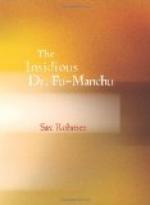“How can you jest with some awful thing—Heaven knows what— hanging over your head? What is the meaning of these perfumed envelopes? How did Sir Crichton die?”
“He died of the Zayat Kiss. Ask me what that is and I reply `I do not know.’ The zayats are the Burmese caravanserais, or rest-houses. Along a certain route—upon which I set eyes, for the first and only time, upon Dr. Fu-Manchu—travelers who use them sometimes die as Sir Crichton died, with nothing to show the cause of death but a little mark upon the neck, face, or limb, which has earned, in those parts, the title of the `Zayat Kiss.’ The rest-houses along that route are shunned now. I have my theory and I hope to prove it to-night, if I live. It will be one more broken weapon in his fiendish armory, and it is thus, and thus only, that I can hope to crush him. This was my principal reason for not enlightening Dr. Cleeve. Even walls have ears where Fu-Manchu is concerned, so I feigned ignorance of the meaning of the mark, knowing that he would be almost certain to employ the same methods upon some other victim. I wanted an opportunity to study the Zayat Kiss in operation, and I shall have one.”
“But the scented envelopes?”
“In the swampy forests of the district I have referred to a rare species of orchid, almost green, and with a peculiar scent, is sometimes met with. I recognized the heavy perfume at once. I take it that the thing which kills the traveler is attracted by this orchid. You will notice that the perfume clings to whatever it touches. I doubt if it can be washed off in the ordinary way. After at least one unsuccessful attempt to kill Sir Crichton— you recall that he thought there was something concealed in his study on a previous occasion?—Fu-Manchu hit upon the perfumed envelopes. He may have a supply of these green orchids in his possession— possibly to feed the creature.”
“What creature? How could any kind of creature have got into Sir Crichton’s room tonight?”
“You no doubt observed that I examined the grate of the study. I found a fair quantity of fallen soot. I at once assumed, since it appeared to be the only means of entrance, that something has been dropped down; and I took it for granted that the thing, whatever it was, must still be concealed either in the study or in the library. But when I had obtained the evidence of the groom, Wills, I perceived that the cry from the lane or from the park was a signal. I noted that the movements of anyone seated at the study table were visible, in shadow, on the blind, and that the study occupied the corner of a two-storied wing and, therefore, had a short chimney. What did the signal mean? That Sir Crichton had leaped up from his chair, and either had received the Zayat Kiss or had seen the thing which someone on the roof had lowered down the straight chimney. It was the signal to withdraw that deadly thing. By means of the iron stairway at the rear of Major-General Platt-Houston’s, I quite easily, gained access to the roof above Sir Crichton’s study— and I found this.”




